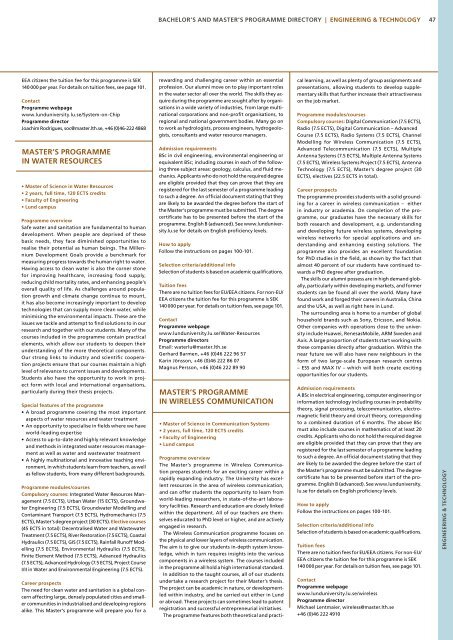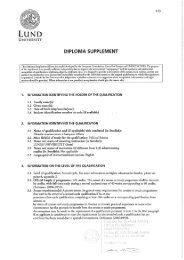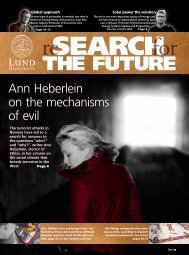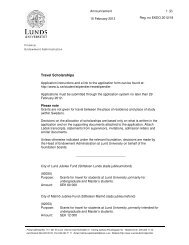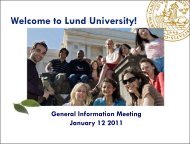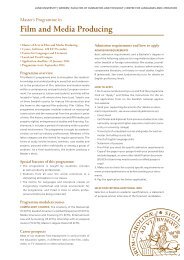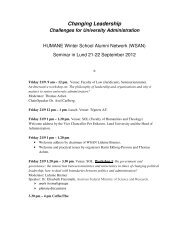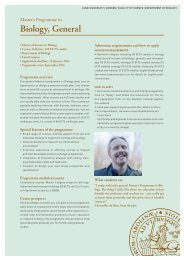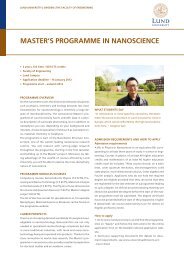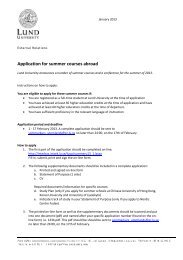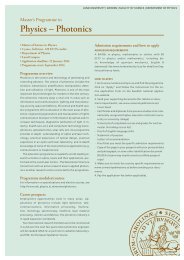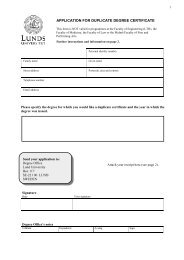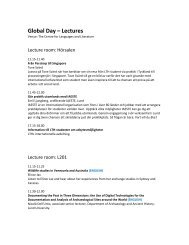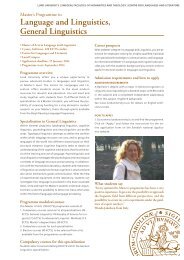Download our 2014/15 international student ... - Lund University
Download our 2014/15 international student ... - Lund University
Download our 2014/15 international student ... - Lund University
Create successful ePaper yourself
Turn your PDF publications into a flip-book with our unique Google optimized e-Paper software.
Bachelor’s and Master’s programme directory | Engineering & Technology47EEA citizens the tuition fee for this programme is SEK140 000 per year. For details on tuition fees, see page 101.ContactProgramme webpagewww.lunduniversity.lu.se/System-on-ChipProgramme directorJoachim Rodrigues, soc@master.lth.se, +46 (0)46-222 4868Master’s Programmein Water Res<strong>our</strong>ces• Master of Science in Water Res<strong>our</strong>ces• 2 years, full time, 120 ECTS credits• Faculty of Engineering• <strong>Lund</strong> campusProgramme overviewSafe water and sanitation are fundamental to humandevelopment. When people are deprived of thesebasic needs, they face diminished opportunities torealise their potential as human beings. The MillenniumDevelopment Goals provide a benchmark formeasuring progress towards the human right to water.Having access to clean water is also the corner stonefor improving healthcare, increasing food supply,reducing child mortality rates, and enhancing people’soverall quality of life. As challenges around populationgrowth and climate change continue to mount,it has also become increasingly important to developtechnologies that can supply more clean water, whileminimising the environmental impacts. These are theissues we tackle and attempt to find solutions to in <strong>our</strong>research and together with <strong>our</strong> <strong>student</strong>s. Many of thec<strong>our</strong>ses included in the programme contain practicalelements, which allow <strong>our</strong> <strong>student</strong>s to deepen theirunderstanding of the more theoretical components.Our strong links to industry and scientific cooperationprojects ensure that <strong>our</strong> c<strong>our</strong>ses maintain a highlevel of relevance to current issues and developments.Students also have the opportunity to work in projectform with local and <strong>international</strong> organisations,particularly during their thesis projects.Special features of the programme• A broad programme covering the most importantaspects of water res<strong>our</strong>ces and water treatment• An opportunity to specialise in fields where we haveworld-leading expertise• Access to up-to-date and highly relevant knowledgeand methods in integrated water res<strong>our</strong>ces managementas well as water and wastewater treatment• A highly multinational and innovative teaching environment,in which <strong>student</strong>s learn from teachers, as wellas fellow <strong>student</strong>s, from many different backgrounds.Programme modules/c<strong>our</strong>sesCompulsory c<strong>our</strong>ses: Integrated Water Res<strong>our</strong>ces Management(7.5 ECTS), Urban Water (<strong>15</strong> ECTS), GroundwaterEngineering (7.5 ECTS), Groundwater Modelling andContaminant Transport (7.5 ECTS), Hydromechanics (7.5ECTS), Master’s degree project (30 ECTS). Elective c<strong>our</strong>ses(45 ECTS in total): Decentralised Water and WastewaterTreatment (7.5 ECTS), River Restoration (7.5 ECTS), CoastalHydraulics (7.5 ECTS), GIS (7.5 ECTS), Rainfall Runoff Modelling(7.5 ECTS), Environmental Hydraulics (7.5 ECTS),Finite Element Method (7.5 ECTS), Advanced Hydraulics(7.5 ECTS), Advanced Hydrology (7.5 ECTS), Project C<strong>our</strong>seI/II in Water and Environmental Engineering (7.5 ECTS).Career prospectsThe need for clean water and sanitation is a global concernaffecting large, densely populated cities and smallercommunities in industrialised and developing regionsalike. This Master’s programme will prepare you for arewarding and challenging career within an essentialprofession. Our alumni move on to play important rolesin the water sector all over the world. The skills they acquireduring the programme are sought after by organisationsin a wide variety of industries, from large multinationalcorporations and non-profit organisations, toregional and national government bodies. Many go onto work as hydrologists, process engineers, hydrogeologists,consultants and water res<strong>our</strong>ce managers.Admission requirementsBSc in civil engineering, environmental engineering orequivalent BSc; including c<strong>our</strong>ses in each of the followingthree subject areas: geology, calculus, and fluid mechanics.Applicants who do not hold the required degreeare eligible provided that they can prove that they areregistered for the last semester of a programme leadingto such a degree. An official document stating that theyare likely to be awarded the degree before the start ofthe Master‘s programme must be submitted. The degreecertificate has to be presented before the start of theprogramme. English B (advanced). See www.lunduniversity.lu.sefor details on English proficiency levels.How to applyFollow the instructions on pages 100-101.Selection criteria/additional infoSelection of <strong>student</strong>s is based on academic qualifications.Tuition feesThere are no tuition fees for EU/EEA citizens. For non-EU/EEA citizens the tuition fee for this programme is SEK140 000 per year. For details on tuition fees, see page 101.ContactProgramme webpagewww.lunduniversity.lu.se/Water-Res<strong>our</strong>cesProgramme directorsEmail: waterlu@master.lth.seGerhard Barmen, +46 (0)46 222 96 57Karin Jönsson, +46 (0)46 222 86 07Magnus Persson, +46 (0)46 222 89 90Master’s Programmein Wireless Communication• Master of Science in Communication Systems• 2 years, full time, 120 ECTS credits• Faculty of Engineering• <strong>Lund</strong> campusProgramme overviewThe Master’s programme in Wireless Communicationprepares <strong>student</strong>s for an exciting career within arapidly expanding industry. The <strong>University</strong> has excellentres<strong>our</strong>ces in the area of wireless communication,and can offer <strong>student</strong>s the opportunity to learn fromworld-leading researchers, in state-of-the-art laboratoryfacilities. Research and education are closely linkedwithin the department. All of <strong>our</strong> teachers are themselveseducated to PhD level or higher, and are activelyengaged in research.The Wireless Communication programme focuses onthe physical and lower layers of wireless communication.The aim is to give <strong>our</strong> <strong>student</strong>s in-depth system knowledge,which in turn requires insights into the variouscomponents in a wireless system. The c<strong>our</strong>ses includedin the programme all hold a high <strong>international</strong> standard.In addition to the taught c<strong>our</strong>ses, all of <strong>our</strong> <strong>student</strong>sundertake a research project for their Master’s thesis.The project can be academic in nature, or developmentledwithin industry, and be carried out either in <strong>Lund</strong>or abroad. These projects can sometimes lead to patentregistration and successful entrepreneurial initiatives.The programme features both theoretical and practi-cal learning, as well as plenty of group assignments andpresentations, allowing <strong>student</strong>s to develop supplementaryskills that further increase their attractivenesson the job market.Programme modules/c<strong>our</strong>sesCompulsory c<strong>our</strong>ses: Digital Communication (7.5 ECTS),Radio (7.5 ECTS), Digital Communication – AdvancedC<strong>our</strong>se (7.5 ECTS), Radio Systems (7.5 ECTS), ChannelModelling for Wireless Communication (7.5 ECTS),Advanced Telecommunication (7.5 ECTS), MultipleAntenna Systems (7.5 ECTS), Multiple Antenna Systems(7.5 ECTS), Wireless Systems Project (7.5 ECTS), AntennaTechnology (7.5 ECTS), Master’s degree project (30ECTS), electives (22.5 ECTS in total).Career prospectsThe programme provides <strong>student</strong>s with a solid groundingfor a career in wireless communication – eitherin industry or academia. On completion of the programme,<strong>our</strong> graduates have the necessary skills forboth research and development, e.g. understandingand developing future wireless systems, developingwireless networks for special applications and understandingand enhancing existing solutions. Theprogramme also provides an excellent foundationfor PhD studies in the field, as shown by the fact thatalmost 40 percent of <strong>our</strong> <strong>student</strong>s have continued towardsa PhD degree after graduation.The skills <strong>our</strong> alumni possess are in high demand globally,particularly within developing markets, and former<strong>student</strong>s can be found all over the world. Many havefound work and forged their careers in Australia, Chinaand the USA, as well as right here in <strong>Lund</strong>.The surrounding area is home to a number of globalhousehold brands such as Sony, Ericsson, and Nokia.Other companies with operations close to the universityinclude Huawei, RenesasMobile, ARM Sweden andAxis. A large proportion of <strong>student</strong>s start working withthese companies directly after graduation. Within thenear future we will also have new neighb<strong>our</strong>s in theform of two large-scale European research centres– ESS and MAX IV – which will both create excitingopportunities for <strong>our</strong> <strong>student</strong>s.Admission requirementsA BSc in electrical engineering, computer engineering orinformation technology including c<strong>our</strong>ses in probabilitytheory, signal processing, telecommunication, electromagneticfield theory and circuit theory, correspondingto a combined duration of 6 months. The above BScmust also include c<strong>our</strong>ses in mathematics of at least 20credits. Applicants who do not hold the required degreeare eligible provided that they can prove that they areregistered for the last semester of a programme leadingto such a degree. An official document stating that theyare likely to be awarded the degree before the start ofthe Master’s programme must be submitted. The degreecertificate has to be presented before start of the programme.English B (advanced). See www.lunduniversity.lu.se for details on English proficiency levels.How to applyFollow the instructions on pages 100-101.Selection criteria/additional infoSelection of <strong>student</strong>s is based on academic qualifications.Tuition feesThere are no tuition fees for EU/EEA citizens. For non-EU/EEA citizens the tuition fee for this programme is SEK140 000 per year. For details on tuition fees, see page 101.ContactProgramme webpagewww.lunduniversity.lu.se/wirelessProgramme directorMichael Lentmaier, wireless@master.lth.se+46 (0)46 222 4910Engineering & Technology


